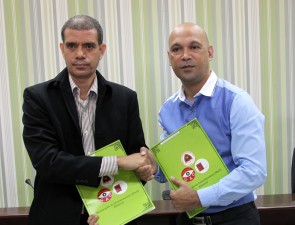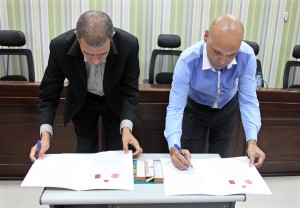SECOMS and CAC sign a memorandum to combat corruption

The Secretary of State for Social Communication (in Portuguese: SECOMS), Nélio Isaac Sarmento, and the Commissioner of the Anti-Corruption Commission (in Portuguese: CAC), Adérito Tilman, signed a Memorandum regarding the dissemination of information to promote good governance and to fight corruption. This ceremony was held in the auditorium of the Presidency of the Council of Ministers, at the Government Palace, on June 16th, 2016, and was accompanied by the director of the Centre for Community Radio (CRC), Luís Evaristo dos Santos Soares.
Nélio Isaac Sarmento stated that this Memorandum shows a good way to combat corruption and promote good governance by means of social communication. CAC will start to produce information for dissemination.
The SECOMS recognized that the population has no information about corruption and the means to combat it. "The Government’s social communication teams and the Anti-Corruption Commission will now work together to produce information on CAC’s activities," stated Nélio Isaac Sarmento.
He continued, stating that their partners in the dissemination of this information are all media in Timor-Leste, which, in addition to the State’s communication bodies, also include radio Metro FM, and, soon, the national news agency.
"Meanwhile, we have been establishing cooperation with various international institutions to train technicians in order to spread information related to the Government's programme to the population," mentioned one Government representative.
The CAC Commissioner stressed that, based on CAC’s Strategic Plan for 2012-2020 and on Law N. 8/2009 (Law of the CAC), it is necessary to establish cooperation within and outside the country, to strengthen the national movement to fight corruption.
The objective of this Memorandum is to disseminate information to the community and to prevent and fight corruption with information.
"We need to develop a legal culture in the institutions of the State, because, in order to ensure good governance, all procedures should be based on the law. We also have to prevent public officials and agents of the State, from committing corruption crimes," said Adérito Tilman.










































